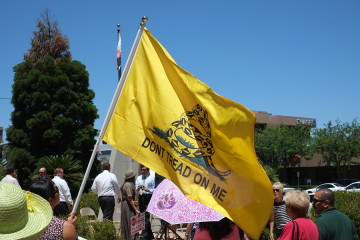*Colleges to Trump: Keep Out

published Jan 30th 2017, 9:11 pm, by Zara Kessler
(Bloomberg) —
U.S. universities are grappling with President Donald Trump’s executive order curtailing immigration and its implications for their eclectic faculty and student bodies. Here are excerpts of their responses — angry, passionate, and personal.
A threat to higher education, and to the nation
As an academic institution with students and scholars from around the world, Stanford values and in fact depends upon the flow of students, educators and researchers across borders. —Marc Tessier-Lavigne, president, John Etchemendy, provost, and Persis Drell, incoming provost, Stanford University
This Order will weaken the promise of educational opportunity, intellectual discovery, and global engagement that so distinguishes American universities. —Amy Gutmann, president, University of Pennsylvania
It is critical that the United States continues to welcome the best students, scholars, scientists, and engineers of all backgrounds and nationalities. —Janet Napolitano, president, and chancellors, University of California
Beyond the [executive order’s] effect on the Berkeley community, there is a far larger story at play: our country itself is at an historic crossroads, in debate not simply over a particular immigration policy, but over the very ideals that define our nation. —Nicholas Dirks, chancellor, University of California, Berkeley
An estimated 17,000 international students in the U.S. are from the seven nations covered by the entry ban. Scholars planning to travel to the United States for meetings and conferences at our colleges and universities will effectively be barred from attending. —Lee Bollinger, president, Columbia University
[We welcome] people who aspire to be brave: people who demonstrate grounded wisdom, a courageous and collaborative spirit, pioneering vision, and a passion for personal and professional growth. These values are not correlated with one’s religious beliefs or country of origin. —Sally Blount, dean, Kellogg School of Management at Northwestern University
Other countries have set the goal of surpassing the United States as the global leader in higher education, research, and innovation. Allowing them to replace this country as the prime destination for the most talented students and researchers would cause irreparable damage, and help them to achieve their goal of global leadership. —Mary Sue Coleman, president, Association of American Universities
Global diversity in leadership of organizations has strengthened American business. Our community is one we’ve worked hard to cultivate, and every member, with the unique background they bring, is an integral part of our collective mission to foster inclusive leadership. —Glenn Hubbard, dean, Columbia Business School
Our international students and scholars are essential to our identity and excellence. We are all Harvard. —Drew Faust, president, Harvard University
It’s personal
We have members of our community from each of the seven named countries. As a research institution, our work depends on dynamic global connections and the ready exchange of knowledge. —The University of Pennsylvania
We are quite concerned about the experience of one of our students upon returning to the United States from Sudan late Friday. This graduate student, a legal permanent resident of the United States, was detained for several hours at Kennedy International Airport, and handcuffed briefly, upon trying to return from a research trip. … An unfortunate consequence of the new policy appears to be that students and scholars from designated countries are, for the moment, effectively detainees in this country. —Tessier-Lavigne, Etchemendy, and Drell, of Stanford
Nearly half of the deans of Harvard’s schools are immigrants — from India, China, Northern Ireland, Jamaica, and Iran. Benefiting from the talents and energy, the knowledge and ideas of people from nations around the globe is not just a vital interest of the University; it long has been, and it fully remains, a vital interest of our nation. … I have initiated a search for Harvard’s first Muslim chaplain, who will serve full-time to provide guidance and support to members of the Islamic faith and to join colleagues in promoting a wider sense of community and understanding among members of different spiritual traditions at Harvard. —Faust, of Harvard
As a scientist who studied and worked in four countries before becoming a citizen of the U.S., I know how important it is to be able to move across borders in peaceful pursuit of one’s scholarship. I know, too, more than most given my background and my field, how much goodwill the U.S. earns for itself through the openness of its education system and how widely those who study here can spread American values. And I know, as well, that these developments are not just a matter of disrupted educational plans or lost opportunities or even damage to the academic enterprise; beyond all that, this order harms one of the most admired and cherished of American principles — religious non-discrimination itself. —Andrew Hamilton, president, New York University
The Stern community is made up of extraordinarily supportive individuals. I invite each of you to offer encouragement to those experiencing fear or disenfranchisement and reassure them they are valued and not alone. —Peter Henry, dean, New York University Stern School of Business
As I have said on many occasions, it is critically important that the University, as such, not take stands on ideological or political issues. Yet it is also true that the University, as an institution in the society, must step forward to object when policies and state action conflict with its fundamental values, and especially when they bespeak purposes and a mentality that are at odds with our basic mission. This is such a case. —Bollinger, of Columbia
I am the daughter of a Jewish immigrant who fled Nazi Germany. My grandfather was an immigrant. My son-in-law is an immigrant. My family’s story is part of a proud and productive American story, as is all of yours. —Gutmann, of the University of Pennsylvania
My father first came to America as an exchange student from a country that had recently been at war with the United States, and he then studied at Purdue University as a foreign graduate student. —Christopher Eisgruber, president, Princeton University
This is a sanctuary
The university keeps student and personnel records private. It does not share information with anyone, including law enforcement authorities, about immigration status, religion, nationality, ethnicity or other information about individual students unless presented with a subpoena or other legally binding requirement. —Tessier-Lavigne, Etchemendy, and Drell, of Stanford
We will not permit federal officials on campus to gather information about immigrants in our community absent a subpoena or similar legal order …. —Hamilton, of New York University
Northwestern will refuse to provide information to the federal government regarding the immigration status of members of our community. Moreover, as stated previously, the Northwestern University Police Department will continue its longstanding policy of not detaining individuals based on their immigration status. —Morton Schapiro, president, Northwestern University
Our federal relations staff are aggressively pursuing these issues with contacts in Washington and locally, and have been in touch directly with the Massachusetts congressional delegation, state leaders, and city officials in Boston and Cambridge to convey our grave concern. [Harvard International Office] staff are working assiduously to develop travel guidance with whatever clarity can be achieved given the circumstances. … [Since November], with support from my office, Harvard Law School’s Immigration and Refugee Clinic has amplified its capacity … by engaging a new, full-time staff attorney specially focused on representing and advising undocumented students in the Harvard community. —Faust, of Harvard
But keep your head down
The executive order also contemplates that additional countries could be added to the banned list. Accordingly, until more information becomes available, and given the possibility of a change in government policy that could go into effect immediately, all foreign nationals should carefully assess whether it is worth the risk to travel outside the country. —Harvard International Office
We are in constant contact with immigration experts, other universities and national associations to understand the implications of the new policies, parts of which have already been successfully challenged in Federal court. … At this point, we have advised individuals from the affected countries avoid all international travel for the immediate future. —Richard Brodhead, president, and Sally Kornbluth, provost, Duke University
On Saturday, we wrote directly to students, faculty, and researchers from the seven nations cited in the order — Iran, Iraq, Libya, Somalia, Sudan, Syria, and Yemen — and highlighted the enormous risk they would be taking should they choose to travel outside the United States while the order remains in effect. … NYU representatives are also supporting students who are facing more immediate challenges from the order. —Hamilton, of New York University
We will do everything in our power, speak to every friend and ally, and leave no stone unturned in our efforts to urge President Trump to change course and rectify the horrible damage this Order has caused. —Gutmann, of the University of Pennsylvania
The story of an American
The topic of immigration is very personal to me. As I reflected in my inaugural address at [Carnegie Mellon University] in November 2013, I first came to the U.S. at age 21 with a partially filled suitcase, less than $100 in cash, and a one-way airplane ticket purchased with a loan. Once in the U.S., I was able to pursue a series of extraordinary opportunities for scholarship and service without regard for my national origin — an experience that forged in me an unshakeable faith in the ability of this nation to help everyone to succeed, wherever they came from. This trust in the system was reinforced even more strongly a few years ago when I was nominated by the President of the United States to lead the National Science Foundation and was unanimously confirmed by the United States Senate, without partisan considerations and without regard to my national origin.
My own story is just one among millions that have shaped the history of this country. Immigration and international collaboration are not footnotes in the story of higher learning. Andrew Carnegie, CMU’s founder and such a central figure in America’s industrial dominance during his time, was an immigrant. All six Americans who were awarded Nobel Prizes in 2016 were born abroad, as were a substantial portion of the membership of the U.S. National Academy of Sciences. Tens of thousands of foreign-born students, researchers, scholars, innovators and faculty members across the country, including many at CMU, do pioneering work at the cutting-edge of science, technology and artistic creativity. The point is clear: our very prosperity and security as a nation, and thus our freedom, depend in part on the people who come to this country from around the world. —Subra Suresh, president, Carnegie Mellon University
To contact the author of this story: Zara Kessler in New York at zkessler@bloomberg.net To contact the editor responsible for this story: Peter Jeffrey at pjeffrey@bloomberg.net
COPYRIGHT
© 2017 Bloomberg L.P
***************************************************************
What they are really saying to Trump, “We need brainpower, and God knows we ain’t going to get any from yahoo students! ———————–W







No Comment